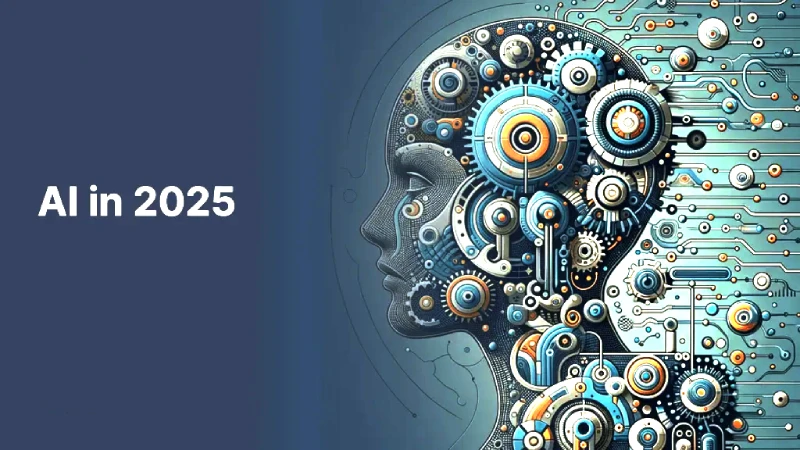
The transformative power of Artificial Intelligence (AI) has fundamentally reshaped industries worldwide, with advancements in machine learning, natural language processing (NLP), and data analytics becoming central to how organizations operate.
As we close another year of groundbreaking innovation, it’s crucial to reflect on AI’s impact on various sectors and anticipate what’s to come by 2025. This blog explores the major trends, challenges, and opportunities in the AI-driven economy.
AI in 2024: A Retrospective Analysis
The year 2024 marked a significant evolution in artificial intelligent technologies, with large language models (LLMs) such as OpenAI’s GPT-4, Google’s Bard, and others demonstrating unprecedented capabilities. These advancements catalyzed innovations across sectors, including healthcare, finance, retail, and manufacturing. Key milestones included:
- Healthcare: Better Diagnosis and Treatment
Artificial Intelligence tools enabled early disease detection, personalized treatment plans, and streamlined administrative workflows. AI models like DeepMind’s AlphaFold continued to revolutionize drug discovery by accurately predicting protein structures. Additionally, wearable devices provided real-time health insights, empowering both patients and clinicians.
- Finance: Improved Risk Management and Fraud Detection
Banks and financial institutions leveraged Artificial Intelligence to improve fraud detection, optimize trading strategies, and personalize customer experiences. Predictive analytics and automated underwriting in insurance became mainstream, reducing costs and improving accuracy. Robo-advisors grew in sophistication, offering tailored investment solutions at scale.
- Retail: Personalization and Supply Chain Optimization
Retailers adopted the tech to enhance customer experiences through hyper-personalized recommendations and virtual shopping assistants. In logistics, artificial intelligence based demand forecasting and inventory management minimized wastage and improved delivery times.
- Manufacturing: Smart Factories and Predictive Maintenance
The adoption in manufacturing saw the rise of Industry 4.0. Smart factories equipped with IoT devices utilized AI algorithms to optimize production processes and predict machinery breakdowns, reducing downtime and costs.
Trends that Drived AI Adoption in 2024
2024 witnessed unimaginable acceleration of artificial intelligence integration across multiple industries and niches. The following trends have and are further set to redefine the explorative world:
- Generative AI Across Industries
Generative AI models like DALL-E, MidJourney, and ChatGPT are no longer confined to creative tasks. They are now employed in prototyping, content generation, and even software development. For instance, AI-driven code generators are accelerating application development cycles.
- Ethical AI and Regulation
As artificial intelligence adoption scales, ethical concerns surrounding bias, transparency, and accountability are gaining prominence. Governments and organizations are establishing AI governance frameworks to ensure responsible deployment. The EU’s AI Act is an example of such regulation.
- Edge AI for Real-Time Applications
The rise of edge computing is enabling applications to process data locally, reducing latency and improving efficiency. This is particularly impactful in autonomous vehicles, smart cities, and healthcare devices, where real-time decision-making is critical.
- AI-Powered Sustainability
Organizations are leveraging AI to drive sustainability initiatives. From optimizing energy consumption in data centers to monitoring environmental changes with satellite imagery, AI is playing a pivotal role in combating climate change.
AI’s Sector-Specific Projections for 2025
Looking ahead to 2025, the revolution is expected to deepen its influence across industries. Here’s what the future holds:
- Healthcare: Precision Medicine and AI-Augmented Surgery
Artificial intelligence is expected to enable precision medicine at scale. Genomic data combined with the tech will offer hyper-personalized treatment plans, while advancements in robotic surgery will enhance precision and reduce recovery times. Virtual health assistants will become more prevalent, providing 24/7 patient support.
- Finance: Autonomous Finance Management
AI-driven tools will evolve into autonomous finance management platforms capable of handling everything from budgeting to tax filing without human intervention. Blockchain and artificial intelligence integration will enhance transparency and security in transactions.
- Retail: Immersive Shopping Experiences
The retail sector will see the widespread adoption of augmented reality (AR) and virtual reality (VR) shopping experiences powered by artificial intelligence. Customers will be able to visualize products in real-world settings, enhancing online shopping experiences.
- Manufacturing: Fully Autonomous Production Lines
Artificial intelligence, combined with robotics, will enable fully autonomous production lines. These smart systems will adapt to changing demands in real-time, ensuring maximum efficiency. Advanced predictive maintenance systems will further minimize operational disruptions.
- Education: Personalized Learning Pathways
Education is being redefined with the future tech by creating personalized learning pathways for students. Adaptive learning platforms will assess individual strengths and weaknesses, tailoring content and pacing to maximize learning outcomes.
- Transportation: Autonomous and Connected Vehicles
The transportation industry takes a leap, with advancements in autonomous vehicles making them safer and more efficient. Artificial intelligence based traffic management systems will optimize city traffic flows, reducing congestion and emissions. Smart logistics will ensure faster and more reliable delivery services.
- Agriculture: Smart Farming Solutions
Smart farming systems will enable precision agriculture, optimizing water usage, soil management, and crop yields. Drone technology combined with smart analytics will monitor large-scale farms, identifying pests, diseases, and resource needs in real time.
- Cybersecurity: Proactive Threat Detection
Machine learning models will proactively detect and mitigate cyber threats, including ransomware and phishing attacks. Smart identity verification systems will enhance security in online transactions.
- Energy: Optimizing Renewable Resources
Artificial intelligence will accelerate the transition to renewable energy by optimizing energy grid management and storage solutions. Predictive analytics will improve the efficiency of wind turbines and solar panels, while AI models will forecast energy demands with greater accuracy.
- Entertainment: Immersive and Interactive Experiences
The entertainment industry will see a surge in artificial intelligence based immersive experiences. It will power hyper-realistic virtual environments for gaming, film production, and live performances. Personalized content recommendations will also evolve, creating unique experiences tailored to individual preferences.
Challenges and Ethical Considerations
Despite its potential, the AI-driven future presents significant challenges:
- Data Privacy
The increasing reliance on data raises concerns about privacy and security. Stricter regulations and advanced encryption methods will be required to protect sensitive information.
- Workforce Displacement
Artificial intelligence’s automation capabilities may lead to job displacement in certain sectors. While new roles will emerge, reskilling the workforce will be essential to bridge the gap.
- Bias and Fairness
Models are only as unbiased as the data they are trained on. Ensuring diversity in datasets and developing mechanisms to identify and mitigate bias will remain critical.
- Energy Consumption
Smart systems, particularly large models, require significant computational power, leading to increased energy consumption. Sustainable practices will need to address this environmental impact.
Preparing for the AI-Driven Future
Organizations must take proactive steps to thrive in an artificial intelligence-based world:
- Invest in Talent: Upskilling employees in AI and data analytics will be crucial.
- Adopt a Data-First Strategy: Building robust data infrastructure will enable organizations to harness artificial intelligence effectively.
- Collaborate with Regulators: Engaging with policymakers will ensure compliance with evolving regulations.
- Focus on Ethics: Developing transparent artificial intelligent models will build trust with stakeholders.
The impact of artificial intelligence on various industries has been profound, transforming business operations, and redefining the future of work. As we move forward into 2025, it’s essential to address the challenges and limitations associated with tech’s adoption, while leveraging emerging trends and technologies to drive innovation and growth.

